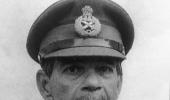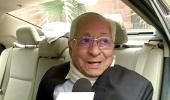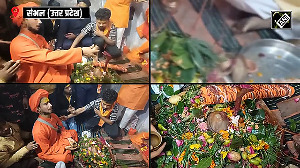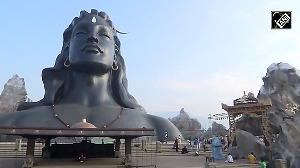Ajit Singh represented a bridge between a constituency that represented a more traditional era in politics and a modern, forward-looking, India, remembers Aditi Phadnis.

A political leader who effortlessly changed hats he wore for Bharat and India died on Thursday.
Ajit Singh, 82, a several-term Union minister and a leader of farmers and Jats had been politically inactive in recent years. But he inherited a strong political legacy left behind by his father, former PM Charan Singh, that he has bequeathed to his son, Jayant Choudhary, former MP from Mathura.
Before joining politics, he was an engineer from IIT and worked at IBM for a brief period.
Ajit Singh cut his teeth on non-Congress politics, though he did steer his party into an alliance with the second Congress-led UPA government till 2014. His primary constituency was the farmers of western UP, both Hindu and Muslim.
Through his political career, his endeavour remained to ensure the rights and claims of farmers were protected: And this led to his guidance, remotely, of the farmers' movement against three Union laws.
His son Jayant was one of the few politicians to be invited to address the protesting farmers -- who maintain that the decision to vote against 'Choudhary Ajit Singh's party' in 2019 was a mistake.

In his lifetime, Ajit Singh had to see the distressing spectacle of his support base splintering after the communal riots in Muzzaffarnagar in 2013. His party failed to get a single seat in the 2014 general election.
But before that, it survived the split of the Charan Singh legacy between Mulayam Singh Yadav, H N Bahuguna and others. He formed the Lok Dal-A and the Janata Party in 1987 and 1988, and became general secretary of the Janata Dal in 1989 with V P Singh. When VP Singh came to power, Ajit Singh became industry minister. He joined the P V Narasimha Rao government as food minister, but resigned in 1996.
In 1998, he founded the Rashtriya Lok Dal and was agriculture minister in the Vajpayee government from 2001-2003 and in UPA 2.0.
Arguably, his most controversial tenure was as civil aviation minister from 2011 to 2014. It was during his term that Air India decided to induct the Dreamliner aircraft though its performance was declining.
Left to himself, Singh may have initiated a correction then itself, but he was part of a government that had Mamata Banerjee as a partner who was stoutly resisting higher FDI levels in the sector. Although the two big airline deals -- Jet-Etihad and Tata-Singapore Airlines agreement -- took place under his tenure, Singh struggled valiantly to modernise Air India.
And if his efforts were largely unsuccessful, it was not for want of trying but for want of succeeding.

He represented a bridge between a constituency that represented a more traditional era in politics, including the continued dominance of the khap system and a modern, forward-looking India.
In interactions with Business Standard, he gave vent sometimes to his sense of frustration and despair at the path, beset as it was with hurdles.
Still, the man who enjoyed jazz and musicals like Hello Dolly would never say no to a glass of white wine and loved Italian food, especially ravioli, will be missed: Mainly because he had no enemies, only friends.












 © 2025
© 2025